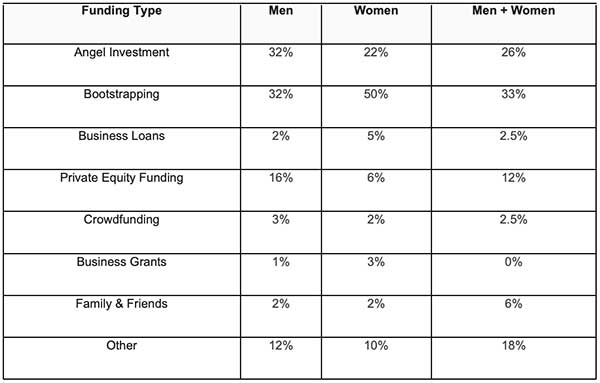UK Startups gender funding gap: male-led businesses receive over 6 times more investment than female-led.
Exclusive new research from Startups.co.uk reveals that funding into new UK businesses still weighs heavily in favour of male-led businesses – who receive 6.2 times more in funding than women-owned ones.
Using data collected from this year’s Startups 100 entrants (244 new businesses in total), here are the key insights into the findings:
Coming just after International Women’s Day 2023, the research highlights that there’s still a lot of progress to be made before women’s new businesses are treated equally to men’s. Please see the table below breaking down the funding types by male-led, female-led, and male and female led businesses:

As a consequence, women are having to bootstrap/self-fund their new businesses more – 50% in comparison to 32% of male-led. This type of funding has a higher chance of failure as well as more of a personal financial risk, which in turn feeds into the negative atmosphere and attitude that women are often faced with in business.
“Confidence is a huge issue”, says Sahar Hashemi, CEO of Buy Women Built. “If you feel the statistics are against you, no one will ever try.”
From the research, two of the main types of business funding – Angel Investment and Private Equity Funding – show the clear difference in funding between men and women owned businesses with both being 10% higher towards men. Businesses that have both a male and female leader also increase the rate of investment by 4% and 6% in these areas respectively.
Startups.co.uk writer and researcher Stephanie Lennox stated: “More female-led businesses were invested in this year – but the numbers are still exceptionally imbalanced, suggesting that the gender funding gap is still a significant issue for women in business today.
Female entrepreneurs looking to start a new business venture may face more difficulties, but by knowing the best business grants for women, crafting a well-rounded business plan, and looking to inspirational entrepreneur success stories, there’s so much that they can achieve now and into the future.”
Here are some insights and initiatives that are empowering funding women-led businesses:
For more information, please contact Ardziv Simonian on ardziv.simonian@startups.co.uk
Scott Ellyson, CEO of East West Manufacturing, brings decades of global manufacturing and supply chain leadership to the conversation. In this episode, he shares practical insights on scaling operations, navigating complexity, and building resilient manufacturing networks in an increasingly connected world.